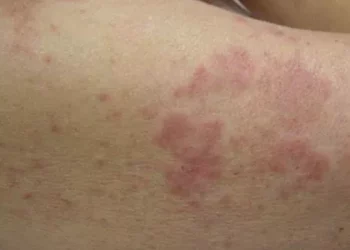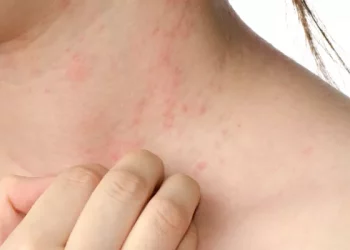Eczema is a skin condition that can cause irritation, itching, and inflammation. One of the most frustrating and distressing symptoms of eczema is oozing. When the skin becomes inflamed and raw, it can break open, leading to oozing or weeping of fluids. This can be uncomfortable and embarrassing. Understanding how to stop oozing eczema is important to manage the condition effectively and promote healing.
In this article, we will explore what causes oozing eczema, how to treat it, and preventive measures you can take to keep your skin healthy and calm.
What is Oozing Eczema?
Oozing eczema refers to the discharge of clear or yellowish fluid from the skin due to open sores or broken skin caused by eczema. This typically happens when eczema flare-ups become severe, leading to skin damage. The fluid that oozes is a mixture of serum (the liquid part of blood) and lymph. It occurs when the skin barrier is compromised, and the body attempts to heal the affected areas.
Oozing eczema often results from the following:
Inflammation: The skin becomes red, swollen, and irritated.
Scratching or Rubbing: Constant scratching can break the skin, causing it to weep.
Bacterial or Fungal Infection: Scratching can also lead to infections, worsening the condition.
Dry Skin: Lack of moisture makes eczema more prone to cracking and oozing.
Common Causes of Oozing Eczema
Understanding the root cause of oozing eczema is crucial in finding the best treatment options. The following are common triggers that may cause eczema to ooze:
Allergies and Sensitivities
Allergens such as pollen, dust mites, pet dander, or certain foods can trigger eczema flare-ups. These allergic reactions often lead to skin irritation and inflammation, causing the skin to break open and ooze.
Harsh Soaps and Detergents
Certain chemicals found in soaps, body washes, and laundry detergents can irritate the skin. These irritants strip the skin of its natural oils, making it more vulnerable to eczema flare-ups and oozing.
Environmental Factors
Changes in temperature, humidity, or exposure to extreme weather conditions can worsen eczema symptoms. Cold, dry air or hot, humid conditions may trigger skin flare-ups and oozing.
Stress
Stress is another factor that can exacerbate eczema. High levels of stress can lead to skin irritation and inflammation, making it more difficult for the skin to heal properly.
Steps to Stop Oozing Eczema
Now that you understand what causes oozing eczema, it is important to know how to treat and manage the condition. Below are several steps to effectively stop oozing eczema.
1. Keep the Affected Area Clean and Dry
One of the first steps to treating oozing eczema is to keep the affected area clean and dry. Oozing fluid can create a breeding ground for bacteria and fungi, leading to infection. To prevent this, gently clean the area with lukewarm water and mild soap. Avoid using hot water, as it can further dry out the skin.
After cleaning, pat the area dry with a soft towel. Avoid rubbing the skin, as this can cause additional irritation. Make sure the skin is completely dry before applying any ointments or creams.
2. Apply a Cool Compress
Applying a cool compress can help soothe the skin and reduce the itching and inflammation associated with oozing eczema. Take a clean cloth or towel, soak it in cold water, and gently apply it to the affected area for 10-15 minutes. This can help alleviate pain and prevent excessive scratching.
3. Use Topical Treatments
There are several topical treatments available to help stop oozing eczema and promote healing:
Hydrocortisone Cream: Over-the-counter hydrocortisone creams or ointments can help reduce inflammation and irritation. Apply a thin layer to the affected area as directed.
Antibiotic Ointments: If you suspect an infection due to oozing, you may need an antibiotic ointment. This will help prevent further infection while your skin heals.
Topical Steroids: For more severe flare-ups, doctors may prescribe stronger topical steroids to reduce inflammation and promote faster healing.
Moisturizers: Use thick, fragrance-free moisturizers to help restore moisture to your skin. Look for creams containing ceramides, which help repair the skin barrier.
4. Avoid Scratching
Scratching the skin when you have eczema can make the condition worse, leading to more oozing, bleeding, and infection. While scratching may provide temporary relief, it can damage the skin and slow down the healing process. Try to keep your nails short, wear gloves at night, or apply an anti-itch ointment to help reduce the urge to scratch.
5. Treat Underlying Infections
If your oozing eczema is accompanied by signs of infection, such as increased redness, warmth, or pus, it is important to treat the infection. Your doctor may prescribe antibiotics or antifungal treatments, depending on the type of infection.
Do not try to self-diagnose or treat an infection. Always consult a healthcare provider for proper treatment.
6. Manage Stress
Since stress can worsen eczema, managing stress is essential in preventing flare-ups. Consider incorporating stress-relieving practices into your routine, such as yoga, meditation, deep breathing exercises, or regular physical activity. Reducing stress can help prevent the cycle of flare-ups and oozing.
7. Use Barrier Creams
Barrier creams are designed to protect the skin from irritants and moisture loss. These creams create a protective layer over the skin, which can help prevent further breakdown and oozing. Look for barrier creams that are fragrance-free and specifically formulated for sensitive skin.
8. Take Short, Lukewarm Baths
Taking short, lukewarm baths can help hydrate the skin and soothe eczema symptoms. Avoid hot water, as it can dry out the skin and make eczema worse. Add a mild, non-irritating bath oil or colloidal oatmeal to the water to help calm itching and inflammation.
After the bath, gently pat your skin dry and immediately apply a moisturizer to lock in moisture.
9. Wear Soft, Breathable Fabrics
Wearing soft, breathable fabrics, such as cotton, can prevent further irritation to the skin. Avoid tight clothing or fabrics like wool or synthetic fibers, as these can scratch the skin and worsen eczema symptoms. Opt for loose-fitting clothing that allows your skin to breathe and prevents excessive sweating.
10. Consult a Dermatologist
If your eczema continues to ooze despite home treatment, it is a good idea to consult a dermatologist. A dermatologist can assess the severity of your eczema, determine if there is an infection, and prescribe stronger medications if necessary. They can also help you develop a personalized skincare routine to prevent future flare-ups.
Preventing Oozing Eczema in the Future
While it may not always be possible to prevent eczema from flaring up, there are steps you can take to minimize the likelihood of oozing episodes:
Hydrate Your Skin: Keep your skin moisturized at all times to maintain a healthy skin barrier. Apply a thick moisturizer immediately after bathing to lock in moisture.
Avoid Triggers: Identify and avoid allergens, irritants, or stressors that may trigger your eczema flare-ups.
Use Gentle Skin Care Products: Opt for mild, fragrance-free soaps, lotions, and detergents to avoid irritating your skin.
Manage Stress: Practice relaxation techniques to reduce stress levels, which can trigger eczema flare-ups.
Keep Fingernails Trimmed: Keeping your nails short will reduce the damage caused by scratching.
Conclusion
Oozing eczema can be uncomfortable and distressing, but with proper care, it can be managed effectively. By keeping the affected area clean and dry, applying the right topical treatments, avoiding scratching, and managing underlying causes like stress or allergies, you can help stop the oozing and promote healing.
If oozing persists or worsens, seek the advice of a dermatologist for further treatment options. By understanding the causes and taking preventive measures, you can keep eczema flare-ups under control and improve your skin health.
Related topics
























